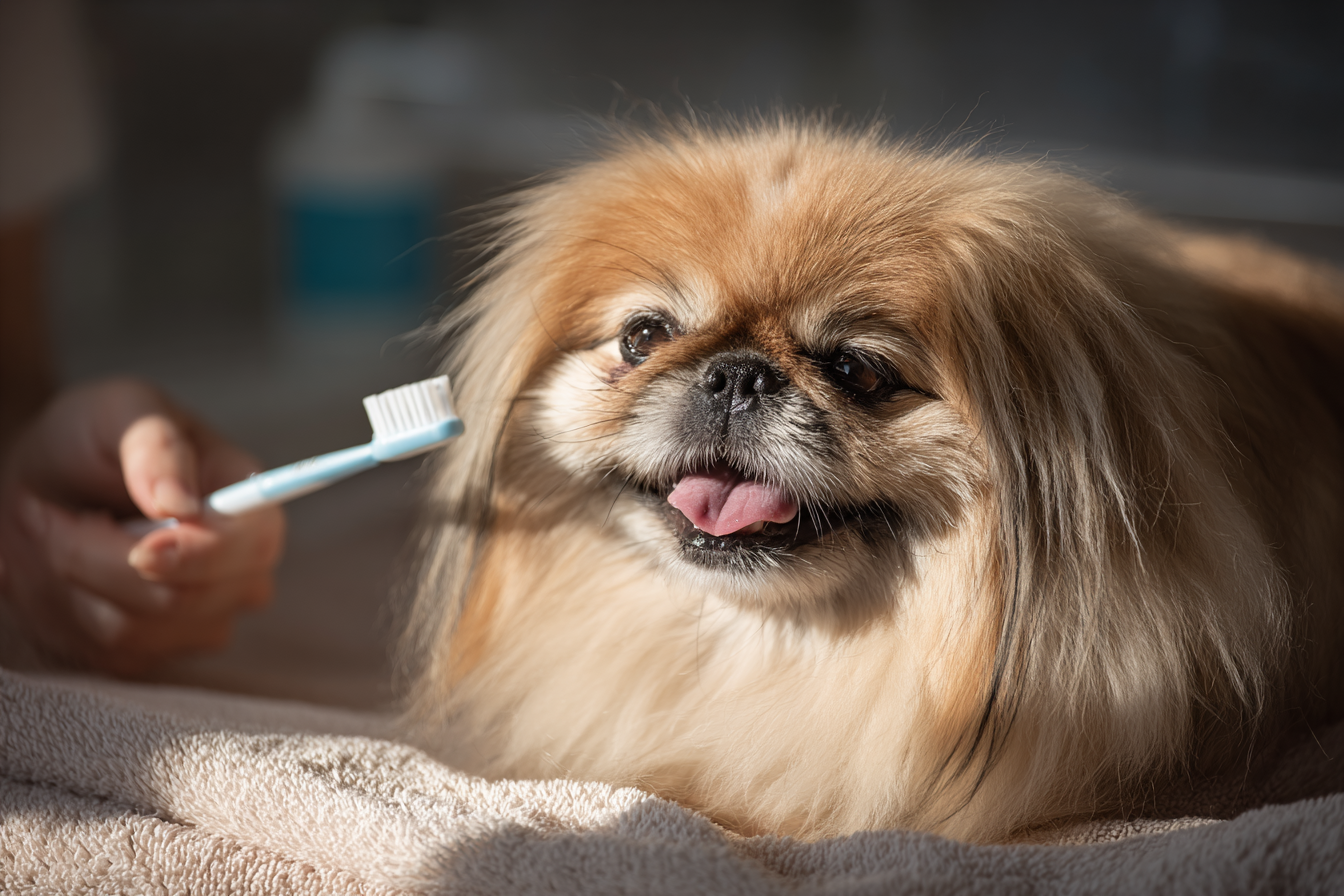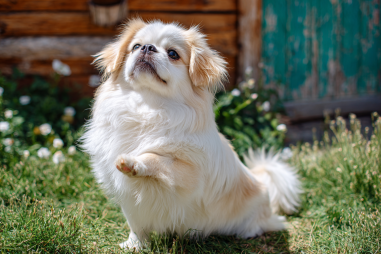Taking care of your Pekingese’s dental health is a vital part of ensuring their overall well-being and happiness. Due to their unique facial structure and small size, Pekingese dogs are particularly prone to dental problems that can cause discomfort and lead to serious health concerns if not addressed promptly. In this comprehensive dental care guide, we’ll explore why dental hygiene is especially important for Pekingese, identify common oral issues they face, and provide practical tips and advice to help you keep your furry friend’s smile healthy and bright.
Why Dental Care is Important for Pekingese
Pekingese dogs have a brachycephalic (short-nosed) facial structure, which means their jaw tends to be shorter and more crowded compared to other breeds. This unique anatomy often results in crowded or misaligned teeth, making it easier for plaque and tartar to build up in hard-to-reach areas. Without regular dental care, this buildup can lead to periodontal disease, tooth decay, bad breath, and pain.
Maintaining good dental hygiene in your Pekingese is not just about keeping their teeth clean; it significantly contributes to their overall health. Poor oral health can allow bacteria to enter the bloodstream, potentially affecting vital organs such as the heart and kidneys. Therefore, a diligent dental care routine is essential to help prevent systemic health issues and improve your dog’s quality of life.
Common Dental Issues in the Breed
Because of their facial structure and small mouths, Pekingese are susceptible to several dental problems including:
- Periodontal Disease: This is the most common dental problem in dogs and involves inflammation and infection of the tissues surrounding the teeth. It can cause gum recession, tooth loss, and bad breath.
- Retained Deciduous Teeth: Sometimes baby teeth don’t fall out properly, leading to overcrowding and increased plaque accumulation.
- Tooth Fractures: Their teeth can be fragile and prone to cracking or breaking, especially if they chew on hard objects.
- Malocclusion: Misalignment of teeth can cause difficulty in chewing and lead to abnormal wear or trauma to other oral tissues.
- Tartar and Plaque Build-up: Without proper cleaning, plaque hardens into tartar, a breeding ground for bacteria that damages teeth and gums.
How to Brush Your Pekingese’s Teeth
Regular brushing is the gold standard for maintaining your Pekingese’s dental health. Though it may require some patience and training, most dogs eventually become comfortable with the routine. Here’s a step-by-step guide to brushing your Pekingese’s teeth effectively:
- Choose the Right Tools: Use a soft-bristled toothbrush designed for small dogs or a finger brush for better control.
- Use Canine Toothpaste: Never use human toothpaste, which can be toxic to dogs. Instead, pick a pet-friendly toothpaste available in flavors that dogs often enjoy, like poultry or peanut butter.
- Get Your Dog Comfortable: Start by gently lifting your dog’s lips and allowing them to sniff and lick the toothpaste. Gradually introduce the brush by letting them get used to the sensation on their teeth and gums.
- Brush Gently: Brush in small circular motions, focusing on the gum line where plaque tends to accumulate. Your goal is to clean the outer surfaces of the teeth clearly visible when your Pekingese smiles.
- Keep Sessions Short and Positive: Initially, brushing for 30 seconds to one minute is sufficient. Reward your dog with praise or a small treat to make the experience positive.
- Frequency: Aim to brush your Pekingese’s teeth at least three times a week, though daily brushing is ideal for optimal dental health.
Recommended Dental Products
Besides brushing, several dental products can complement your Pekingese’s oral care routine:
- Dental Chews and Treats: Specially designed chews can help reduce plaque and tartar buildup by mechanically cleaning the teeth.
- Water Additives: Adding a dental water additive to your dog’s drinking water can help reduce bacteria and freshen breath.
- Dental Sprays and Gels: These products can be applied directly to your dog’s teeth and gums to fight bacteria and plaque.
- Dental Wipes: Convenient for quick oral wipe-downs, especially when brushings aren’t possible.
- Appropriate Chew Toys: Provide rubber or nylon chew toys that encourage chewing — this combats tartar buildup without damaging teeth.
When selecting these products, ensure that they are specifically formulated for dogs, preferably with veterinary approval. Consulting your vet about product recommendations tailored to your Pekingese is always a good idea.
Signs of Dental Problems
Early detection of dental issues can prevent more serious complications. Look out for these common signs that may indicate problems with your Pekingese’s oral health:
- Bad Breath: Persistent foul odor from the mouth is often one of the first signs of dental disease.
- Red or Bleeding Gums: Inflammation or bleeding during or after brushing may indicate gingivitis.
- Excessive Drooling or Dropping Food: Difficulty eating or playing with food can signal pain in the mouth.
- Loose, Broken, or Missing Teeth: Visible dental damage is an obvious problem that needs attention.
- Pawing at the Mouth or Face: Discomfort or pain may cause your Pekingese to paw at their face frequently.
- Swelling Around the Mouth or Jaw: This could be a sign of a tooth root infection or abscess.
If you notice any of these symptoms, consult your veterinarian promptly for an oral examination.
Professional Dental Cleaning
While home dental care is essential, professional dental cleaning by a veterinarian is the only way to remove hardened tartar and thoroughly inspect your Pekingese’s oral health. This procedure is typically done under general anesthesia to allow for complete cleaning above and below the gum line and enable dental X-rays if necessary.
Most veterinarians recommend professional dental cleanings once a year, though the frequency may increase depending on your dog’s oral health and breed predispositions. Between cleanings, maintaining daily dental care at home will prolong the benefits and keep your Pekingese’s teeth and gums in good condition.
Additionally, during professional cleanings, veterinarians can identify and treat any underlying problems like tooth extractions, oral infections, or biopsies for unusual growths.
Keeping Your Pekingese’s Smile Bright
Good dental hygiene can significantly enhance the health and happiness of your Pekingese. By understanding their specific dental care needs and committing to regular brushing, providing appropriate dental products, recognizing early signs of trouble, and scheduling professional cleanings, you’re ensuring your furry friend enjoys a comfortable and pain-free life.
Remember, dental care is an ongoing commitment, not just a one-time task. With patience, consistency, and love, your Pekingese will reward you with endless affection and a bright, healthy smile.







